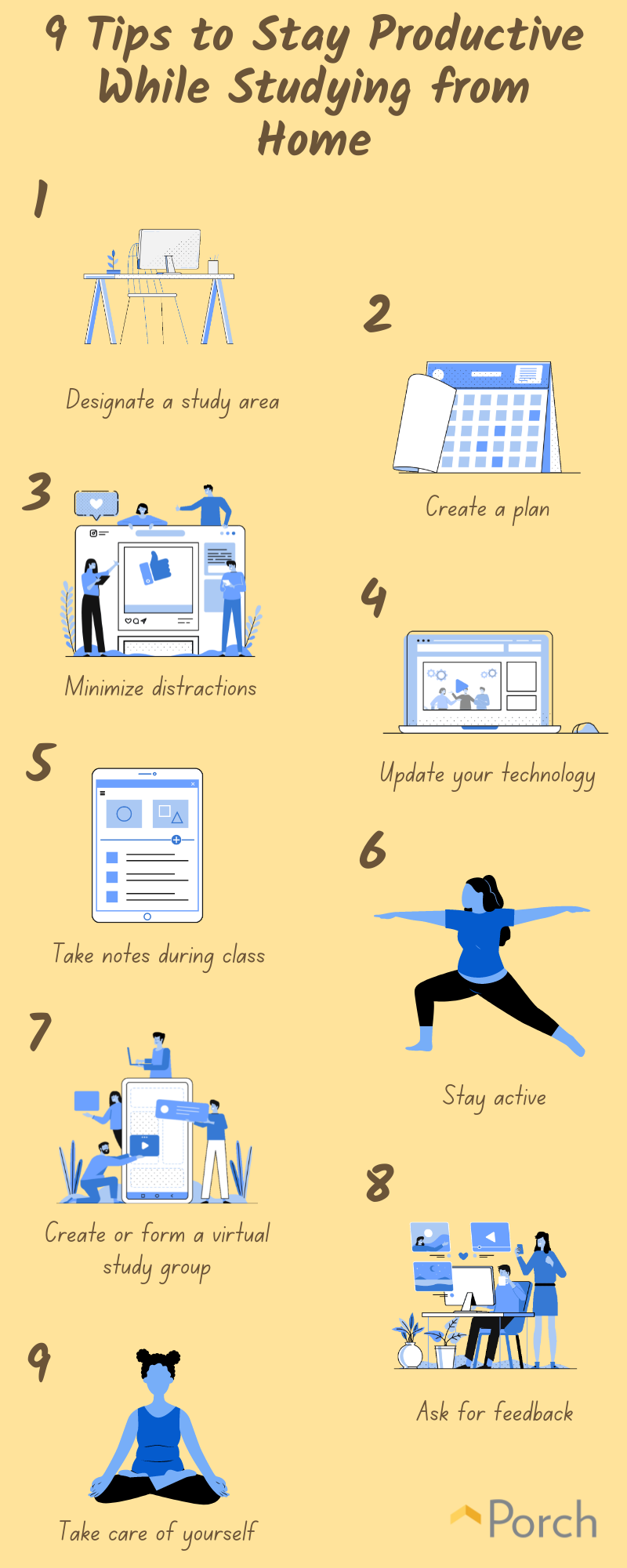The concept of distance learning isn’t new, but it is certainly becoming a popular choice for many students. The demand for high-quality remote learning is increasing thanks to various factors, including easier, broader access to the Internet, and more people dealing with demanding schedules. There are many amazing benefits to choosing online education, particularly the flexibility to choose your own schedule. If you have children, getting a degree without having to set foot in a classroom can be extremely beneficial to yourself and your kids, too.
Those with full-time careers can also benefit greatly from distance education. If you’re currently learning remotely, how can you be sure that you stay productive while you’re studying from home? Here are nine helpful productivity tips that can make your e-learning experience easier to set you up for success. When you follow these steps, you’ll be able to get your degree, approve an important exam, or complete an online course to help you reach your goals.
9 Tips for productivity while distance learning
Consider these nine helpful tips to make it easier for you to stay focused, be productive, and achieve your distance learning goals.

1. Designate a study area: If you want to focus and stay productive, it’s crucial to have your own separate space for studying and learning. Choose a room where it’s quiet, comfortable, and where you will have plenty of good lighting. A spare bedroom, a room over the garage, or even a corner of your living room can be a good area for remote learning. Make sure you have some comfortable furniture like a supportive ergonomic office chair and a roomy desk where you can work comfortably and spread out if you need to.
The key is to designate a separate space for studying that’s quiet and free from distractions to help you focus. Don’t forget to add a few decorations like some artwork or motivational pictures to give the study area personality. Place your desk so that it faces the wall, which helps to reduce extra distractions, and consider hiring a handyman to help you with setting up your desk, chair or any minor projects you might need help with.
2. Create a plan: Without a solid plan in place, it’s much more challenging to reach your remote learning goals. Start by setting a goal for which specific courses you want to complete or what type of degree you want to obtain. Next, give yourself a predetermined time frame for when you want to complete a course or finish your degree, master’s, MBA degree, or Ph.D. Then research the different types of study resources available to you. Once your plan is ready and you’re enrolled, stick to a set schedule and establish a routine. When you have a daily goal and schedule, it’s much easier to take part in a daily routine you can stick to. Remember to schedule breaks during your busy days to keep your mind and body healthy.
Take a walk or enjoy a lunch break with a friend to clear your mind and reset so that you can get back to the task at hand with a clear head. It’s also important that you reward yourself whenever you reach a goal. You can buy a new piece of clothing, treat yourself to lunch, or enjoy a movie with a friend to celebrate your successes, both large and small.
3. Minimize distractions: In today’s busy world, it’s easy to get distracted and let your mind wander. When you’re distracted, you’re losing sight of the task at hand, and your productivity can plummet. Do your best to keep distractions to a minimum, and properly manage time while you’re “in class” or studying by muting your smartphone, putting it aside, or at least putting it in airplane mode. Close any extra tabs on your Internet browser that aren’t related to your class.
Practice mindfulness daily with a brief morning meditation to help you focus more effectively. At the end of each day, write down your plans for the next day so that you already have a schedule and a plan in place. It’s also essential to participate in distance learning in an area that’s comfortable, quiet, and free of extra distractions so you can stay focused.
4. Update your technology: Make sure that your computer or laptop is updated and that your Internet is up to speed so it can handle the demands of remote online learning. Consider upgrading your current computer to something new if you have the money. A quality computer should have speakers that make it easy to hear your professor clearly. The screen should be crisp and bright so that it’s easy to see. You can also take advantage of helpful technology tools like online schedulers, planners, and calendars. Use these tools to help you set reminders, track your goals, and stay on top of important dates like major tests and exams.
Always install an antivirus to protect your data and computer from getting corrupted by malicious software and viruses. Having good antivirus software installed on your computer will prevent theft of information like credit cards or personal details or sending unauthorized messages to your contacts.
5. Take notes during online classes: Make sure you pay close attention to details and take thorough notes during your class. Use various notebooks, different-colored pens, and other supplies to help you in the learning process. Keep your notes organized in a binder and separate different sections using tags or labels. If possible, record each class so you can go back and watch it later. This is a great way to ensure that you’re jotting down the most important points to help you succeed. Thorough notetaking can make a huge difference when it’s time to study for a test. Ask your classmates if they have any helpful tips to share with you, too.
6. Stay active: Remember that your body needs to be just as active as your mind to stay productive. Don’t forget to do a little physical activity during your busy school days, like go for a short jog, take a brisk walk around the block, or do some yoga before classes begin. Moving your body helps stimulate your muscles, including your brain, so that you can stay invigorated, motivated, and ready to tackle your day. Even just a few short minutes of exercise during breaks can help you feel more alert. Exercise also promotes a positive outlook, which has been shown to improve motivation too.
7. Join or form virtual study groups: Just because you’re not in a real classroom, it doesn’t mean that you can’t take advantage of help from study groups. If there isn’t already a virtual study group for your class, be proactive and start your own. Contact your fellow students and ask them if they’d be interested in forming a group so that you can help each other out. Many online universities offer the chance to join a study group through the school’s platform. Look for study groups that you can join to compare notes, get help from others, and where you can socialize with your peers. Working as a team or in a group can also help you feel less alone and boost your mental health. Use various virtual platforms like Zoom or Skype to set up remote group meetings. More preferably, use a digital board for online classes, where you can make video calls and have all the whiteboarding tools like pens, pointers, shapes, etc., necessary for educational discussions.
8. Ask for feedback: If you can contact your instructor, don’t be afraid to ask them for some help or feedback to gauge your progress. It’s important to know how you are doing to know you’re on the right track. Find out if you can get specific feedback on your work and your progress to determine which areas may need improvement and find out if there are any opportunities you may have overlooked. Most online professors are more than happy to offer their contact information in case students need some guidance.
9. Take care of yourself: When you’re studying from home, it can be easy to forget to take care of your physical and mental health. These are the two most important aspects that will help you achieve success, so make sure that you’re mindful to practice regular self-care. Make sure that you are eating a healthy diet and not skipping meals. Proper sleep is also important for a clear, active mind the next day and keeps stress to a minimum. Do your best to avoid burnout by taking frequent breaks and not overloading your schedule. Avoid multitasking when possible, as this can actually make stress and burnout worse. Instead, focus on just one task at a time and remember to take breaks as you go. When you take good care of yourself, it’s easier to stay focused so you can keep your goals in mind and remain motivated while you’re learning and studying.
Participating in remote education has a wide range of benefits, most notably the ability to have a flexible schedule that suits your lifestyle. Learning and studying from home can be easy if you stay focused and give yourself a quiet, comfortable workspace. Take breaks often, exercise, and get proper sleep to remain focused and reach your education goals.




